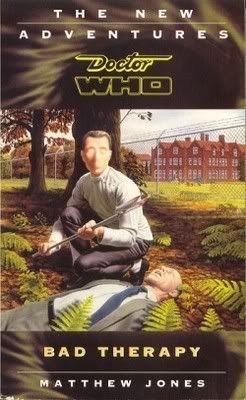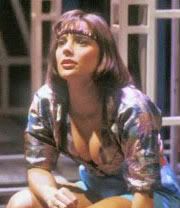
Bad Therapy by Matthew Jones
In Brief: The Doctor and Chris, in 1958 London and still mourning the death of Roz, become involved in the plight of The Toys, a race of beings specially made to be the perfect companion.
I had very clear memories of Bad Therapy from reading it originally in 1997. It had stuck out as being a particularly strong story based around themes of loss, longing and what it means to be an independent person. 15 years later I struggled to see why the book made such a big impression, although it does have some very effective parts and a very strong core story.
The biggest distraction, and the most fundamental, is that Jones' prose isn't very developed. We're not down to Terrance Dicks levels in terms of simplicity of style, but definitely in the same ball-park. While having clear and effective writing isn't necessarily a bad thing (especially when compared to the muddle of some of the lesser New Adventures), in a book that desperately wants to have a huge emotional heft it leaves things feeling a bit too light. The Toys are truly tragic figures, only able to live through the desires of others, but the impact is missing. Giving this story to Kate Orman or Paul Cornell would have done wonders.
Considering Matthew Jones would later go on to write the 2006 episodes "The Impossible Planet" and "The Satan Pit" with certain success shows that he's probably a better action-writer.
Another minor annoyance in the book was the character of Jack. Originally Jack stuck out for being a positive and prominent gay character, forced to deal with the problems of living as he is in 1958 London. However, in this post-Capt. Jack world the "novelty" of having A Ggay in Doctor Who is gone, and we're left with a rather dull result. It's often a fault of many writers (and movie-makers) that they assume that a gay character will be interesting due to their sexuality alone, which is never the case. While it's possible to complain about Russell T. Davies mildly negative use of gay characters in the earlier Damaged Good at least they were interesting and developed. In contrast Jack's *only* notable trait is that he's gay, otherwise he might as well be Chris or any other generic companion.
His dull character is really highlighted when he pales in comparison to a returning Peri, a companion never known for her well-rounded personality.

But *very* well known for her well-rounded...
This is a Peri who's been trapped on a distant planet for 25 years, forced into marriage after The Doctor's abandonment of her during "The Trial of a Time Lord". Needless to say she's not happy with the reunion (much like when Mel came back in Head Games). Although it may seem a bit random, having Peri come back and forcing The Doctor face the consequences of his actions is one of the better parts of the book, as he has to face the damage that he inflicts on those around him (mirrored by the grieving Chris). This stripping down of The Doctor's strength and confidence is part of the wrapping up of the series, as we head into the change to Doctor #8.
But what should have been a highlight of the series still just ends up being a bit ho-hum.
Chris, now coming to grips to the loss of Roz, has a decent if brief sub-plot where he falls for a Toy due to her taking on some of his projected personality traits of Roz. Although somewhat brief these parts of the book do make good use of his character, and finally give him some needed depth. It was frustrating the Jones could be so good with the regulars, but really miss the mark with his own characters. Even the characters who aren't Toys (or Jack) are somewhat bland.
Another aspect of Bad Therapy which is a bit of a miss is the story itself. Once the villain is met (the insane Moriel from the same planet as Peri ended up on, hence the time/space tunnel) not much is really done with him except to explain that he was behind the creation of the Toys as an attempt to recreate his long-dead wife. There have been New Adventures in the past that have been purposefully light on plot, but there's not really enough here to fully fill the gap. Bad Therapy also has the problem of having poor structure, so that what feels like the climax happens about 50 pages too soon. So the final section of the novel feels somewhat like an exercise in dragging events out through a 2nd-ending in order to increase the page-count, even though everything could have been better wrapped up earlier.
However, despite my complaints this isn't a bad book. It has some good ideas and effective parts. It's just frustrating since it could have been so much better. Possibly Bad Therapy would work better as a TV-story rather than as a novel, where visuals and actors could fill in the emotional punch. As is, the book has ambition but ends up merely mediocre.
No comments:
Post a Comment